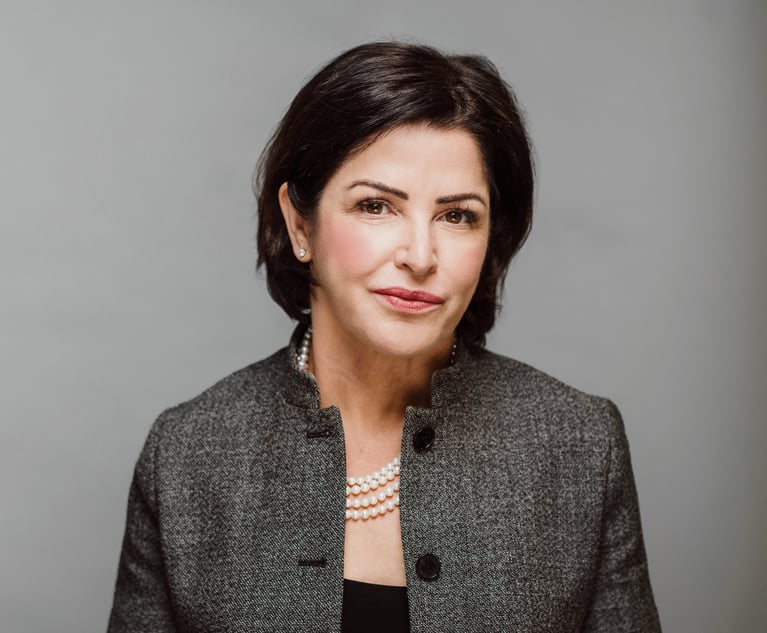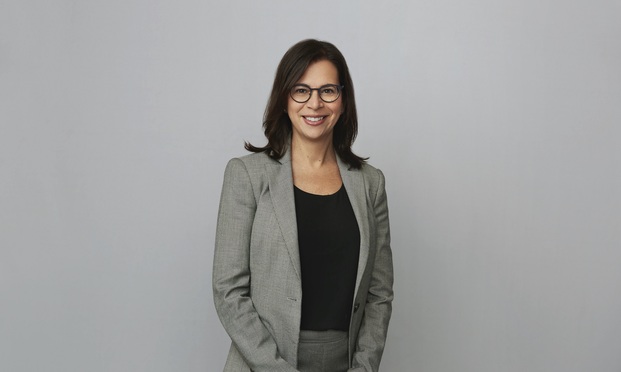Closing the Gender Gap Must Remain a Law Firm Priority, Even in a Crisis
History suggests that in times like these that we need more women in leadership positions, says Burford Capital's co-COO
May 13, 2020 at 01:59 AM
6 minute read
Right now, the world is understandably preoccupied by the COVID-19 pandemic and its devastating human and economic toll. But even in the midst of this crisis, closing the gender gap in law remains a priority for me—and should remain so for law firms and the legal teams that decide whether to hire them.
Indeed, history suggests that it is exactly at times like these that we need more women in leadership positions, including in law. For example, according to an IMF report, the Lehman Brothers collapse in the 2008-2009 financial crisis could have been avoided if the bank had more women in positions of authority, as women could have minimized reckless decision-making and the eventual demise of the business.
Sadly, an uncertain economic climate may disproportionately disadvantage women—and women lawyers. Because women lawyers tend to inherit fewer client relationships than their male counterparts and often receive less origination credit, the law firm layoffs that have become increasingly common of late may hurt more women lawyers. Despite there being very few women equity partners compared to men, 50% of the equity partners who were terminated in 2008 were women.
Like so many other sectors, the business of law faces real challenges right now—and women are well-suited to help address those challenges. For example, companies are facing more disputes arising out of the present downturn exactly at the moment when cash to pay to pursue those disputes is growing scarcer. According to a forthcoming study commissioned by Burford Capital, GCs are nearly unanimous in saying that the quality of women litigators' work is equally as good as that of their male counterparts—and they are significantly more likely to say that women litigators are more efficient based on factors such as speed to resolution and/or cost management. GCs and the businesses they represent need that efficiency right now.
Nonetheless, a longstanding gender pay gap remains stubbornly persistent in law. Despite making up half of law school graduates, women still account for barely 20% of law firm equity partners, according to a 2019 American Bar Association and American Lawyer Media Intelligence study. The situation is better than it was when I became a lawyer 25 years ago, but the pace of change is unacceptably slow. At the current rate of change, my teenage daughter may see equity, should she decide to enter law, around retirement. That's too long to wait.
The slow pace of change hits home for me in many ways. In 2018, to create an economic incentive to speed the pace of change, I led Burford's launch of The Equity Project, a $50 million pool of legal finance capital earmarked to back women-led litigation and arbitration matters. Our thinking was that we could encourage equitable outcomes by putting out capital to finance high-stakes commercial matters led by women litigators or women-owned firms, where a woman is earning origination or client relationship credit, or where a woman is serving as lead counsel on a plaintiffs steering committee. By having skin in the game as a risk-sharing partner, we could encourage women to pitch new business opportunities, we could encourage their firms to back them and we could encourage their clients to hire them.
But in order for us to finance high-stakes commercial matters led by women and have this impact, women and law firms first have to bring those matters to our attention. It remains the case that of the thousands of such matters Burford looks at every year, an extraordinarily small number are led by women. That was true before we launched The Equity Project—and indeed it's what led me to the idea to create a pool of capital to back women litigators. Sadly, it remains the case that of the 1,414 matters brought to us in 2019, only a very small number were led by women.
We knew this would be a difficult undertaking given the underlying scale of the gender diversity problem in law, and neither I nor Burford nor the 22 Equity Project champions from leading firms and companies are giving up.
We know that simply by bringing attention to the issue we can change the conversation. When we launched the initiative, I got a call from a woman at a leading litigation boutique telling me that her managing partner had asked her to lead a high-profile case after hearing about The Equity Project. We didn't back her on that matter but we did make a difference.
We are also bringing attention to the topic. Working with our Equity Project Champions, we've posted articles, been active on social media and spoken at conferences. We have hosted events including business development and networking sessions on two continents. Most recently, we hosted a webcast Q&A with Tara Lee—an Equity Project Champion who is co-chair of Quinn Emanuel's National Trial Practice—on how law firms can promote gender equity and inclusion in a world of social distancing.
In late May 2020, we will release new research commissioned by Burford that studies how leading companies address the gender gap, based on extensive one-on-one interviews with 75 GCs and heads of litigation.
But we need—indeed we urge—law firms to join us in this effort. Law firms that bring us meritorious women-led matters can promote gender diversity at their firms and ensure that it remains the priority it needs to be for their businesses.
With capital from The Equity Project, women litigators and women-owned firms can pitch clients knowing that they can offer attractive alternative fee arrangements. A woman lawyer can show a client it's possible to fund their litigation without adding pressure to their balance sheet and use legal finance to convince her firm's contingency fee committee to move forward with a case she might otherwise not bring to the committee. Law firms committed to gender diversity can share risk with Burford and encourage women litigators to pitch client-friendly alternative billing arrangements to their management committees for new business.
Law firms that are feeling pressure from a decline in revenue may be tempted to cut diversity initiatives. But leveraging The Equity Project doesn't cost law firms or their clients money out the door. And in times of economic strife it's inherently beneficial for organizations—including law firms and the clients they serve—to have a diversity of perspective. We know that greater levels of gender diversity at the highest echelons of organizations tend to lead to better business outcomes.
We know we can do more to bring about change, and we know that it matters now perhaps more than ever. We urge law firms and their clients to partner with us in this effort.
Aviva Will is the co-COO of Burford Capital and also the founder of the Equity Project, which incentivizes firms to put women as lead partners on litigation or arbitration through a $50 million pool of capital.
This content has been archived. It is available through our partners, LexisNexis® and Bloomberg Law.
To view this content, please continue to their sites.
Not a Lexis Subscriber?
Subscribe Now
Not a Bloomberg Law Subscriber?
Subscribe Now
NOT FOR REPRINT
© 2025 ALM Global, LLC, All Rights Reserved. Request academic re-use from www.copyright.com. All other uses, submit a request to [email protected]. For more information visit Asset & Logo Licensing.
You Might Like
View All

Pallas Partners Founder On the Disputes Trends to Look Out For in 2025
4 minute read
What to Expect From Teresa Ribera, the EU‘s New Competition Commissioner
6 minute readLaw Firms Mentioned
Trending Stories
Who Got The Work
J. Brugh Lower of Gibbons has entered an appearance for industrial equipment supplier Devco Corporation in a pending trademark infringement lawsuit. The suit, accusing the defendant of selling knock-off Graco products, was filed Dec. 18 in New Jersey District Court by Rivkin Radler on behalf of Graco Inc. and Graco Minnesota. The case, assigned to U.S. District Judge Zahid N. Quraishi, is 3:24-cv-11294, Graco Inc. et al v. Devco Corporation.
Who Got The Work
Rebecca Maller-Stein and Kent A. Yalowitz of Arnold & Porter Kaye Scholer have entered their appearances for Hanaco Venture Capital and its executives, Lior Prosor and David Frankel, in a pending securities lawsuit. The action, filed on Dec. 24 in New York Southern District Court by Zell, Aron & Co. on behalf of Goldeneye Advisors, accuses the defendants of negligently and fraudulently managing the plaintiff's $1 million investment. The case, assigned to U.S. District Judge Vernon S. Broderick, is 1:24-cv-09918, Goldeneye Advisors, LLC v. Hanaco Venture Capital, Ltd. et al.
Who Got The Work
Attorneys from A&O Shearman has stepped in as defense counsel for Toronto-Dominion Bank and other defendants in a pending securities class action. The suit, filed Dec. 11 in New York Southern District Court by Bleichmar Fonti & Auld, accuses the defendants of concealing the bank's 'pervasive' deficiencies in regards to its compliance with the Bank Secrecy Act and the quality of its anti-money laundering controls. The case, assigned to U.S. District Judge Arun Subramanian, is 1:24-cv-09445, Gonzalez v. The Toronto-Dominion Bank et al.
Who Got The Work
Crown Castle International, a Pennsylvania company providing shared communications infrastructure, has turned to Luke D. Wolf of Gordon Rees Scully Mansukhani to fend off a pending breach-of-contract lawsuit. The court action, filed Nov. 25 in Michigan Eastern District Court by Hooper Hathaway PC on behalf of The Town Residences LLC, accuses Crown Castle of failing to transfer approximately $30,000 in utility payments from T-Mobile in breach of a roof-top lease and assignment agreement. The case, assigned to U.S. District Judge Susan K. Declercq, is 2:24-cv-13131, The Town Residences LLC v. T-Mobile US, Inc. et al.
Who Got The Work
Wilfred P. Coronato and Daniel M. Schwartz of McCarter & English have stepped in as defense counsel to Electrolux Home Products Inc. in a pending product liability lawsuit. The court action, filed Nov. 26 in New York Eastern District Court by Poulos Lopiccolo PC and Nagel Rice LLP on behalf of David Stern, alleges that the defendant's refrigerators’ drawers and shelving repeatedly break and fall apart within months after purchase. The case, assigned to U.S. District Judge Joan M. Azrack, is 2:24-cv-08204, Stern v. Electrolux Home Products, Inc.
Featured Firms
Law Offices of Gary Martin Hays & Associates, P.C.
(470) 294-1674
Law Offices of Mark E. Salomone
(857) 444-6468
Smith & Hassler
(713) 739-1250










